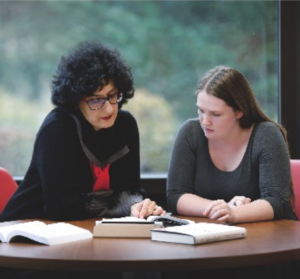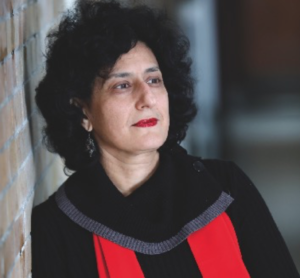Caldwell University
February 10, 2015
Ellina Chernobilsky: A Global Vision of Teaching
Even as a little girl growing up in the communist-ruled USSR, Ellina Chernobilsky knew she wanted to be in the classroom. “Teaching is a chance to see my own role in the world, an opportunity to understand how others view the world,” she says.
Chernobilsky, an associate professor in the education division, says her biggest reward is to learn “with and through” her students. As the director of graduate studies, overseeing 30 graduate programs, she works with faculty so students are happy and have “everything they need in order to be successful.”

She has seen that kind of caring in good teachers and administrators around the globe. Recently back from a trip during which she spoke with educators in Tomsk (in western Siberia) and in Moscow, she recognizes how committed teachers share the same foundations. “We may have different philosophies and pedagogies,” but the similarities are “good organization skills, good preparation and understanding and caring for the student.”
Chernobilsky is intrigued by how teachers in different cultures understand what it means to care for students—so much so that for the last several years she has been studying what it means to care as an educator. What started as research for the Teacher Education Accreditation Council accreditation process has developed into broader studies. She has worked with colleagues from China, South Korea, Russia and the United States to collect data and to understand different approaches to caring. She has hosted educators from Tomsk, Moscow and Holon, Israel, on Caldwell’s campus, working to form partnerships. In addition, she represented Caldwell while teaching English at Wuhan University in China for five weeks and led a short study initiative on Caldwell’s campus with students from South Korea.
In November at Tomsk Polytechnic University in western Siberia, Chernobilsky gave a keynote address at an international conference on how technology is used in higher education and “helps us evolve as educators.” She cited Caldwell as an example since the university has seen exponential growth in its use of technology for learning over the last few years. Audience members were so impressed they invited her to speak to department faculty and students at Tomsk State Pedagogical University and to middle and high school educators. In Moscow, she attended the multi-university 120th birthday celebration of the Russian psychologist Lev Vygotsky, whom she says is the father of modern social constructivist philosophy in education and psychology. She spoke about technology with post-baccalaureate students at Moscow State University of Education and with students at the Higher School of Economics National Research University, also in Moscow. At the Education USA office in Moscow she met with prospective students.
She is collaborating with administrators from Moscow who visited Caldwell University last year on “what we can do together to get our students talking to each other.”
Growing up under communism in Uzbekistan

Chernobilsky’s parents—Bukharian, or Central Asian, Jews—made education a top priority when she was growing up in Soviet-ruled Tashkent, the capital of the Republic of Uzbekistan and one of the oldest towns in Central Asia. She went to a special school where she was exposed to the broader world and started learning English at eight years old. In 1979, her father asked for permission to leave and was denied. “The door was shut,” Chernobilsky says. Her mother, who was a pharmacist, and her father, who worked in several professions before becoming a civil engineer, pushed her to become an engineer. Once Chernobilsky convinced them to let her pursue teaching, she began studying at the Institute of Foreign Languages in Tashkent. She worked providing translation to individuals and businesses and was on track to become an English teacher. In 1991, just a few months shy of receiving her university diploma and about six months before the collapse of the Soviet Union, she and her family were able to leave their homeland. “I only told one or two people I was leaving,” says Chernobilsky.
Her extended family emigrated to New Jersey, and Chernobilsky’s ability to speak English proved to be of great value as she became the family’s sole translator. She enrolled at Upsala College, studying business administration and computer information systems and discovered a love for technology.
After graduating, Chernobilsky worked in a cotton business, buying and selling in Memphis, Tennessee. During this time, she married Mikhail Chernobilsky, who had found her online, something of a novelty at the time. She realized that business was not her calling and decided to go back to school for education. “I was really lucky. I met someone who believed in me and gave me a job teaching Russian as an adjunct at the University of Memphis.” The experience taught her how important it is for young professionals to have mentors and people who believe in them. “You need to be free to experiment and learn about yourself. If you make a mistake, it’s a chance to debrief, reflect, look another way and move on.” For those who succeed, the process is somewhat similar, she says. “One always has to reflect and define goals, and it dims your sense of fear.”
While studying and teaching at the University of Memphis, she started teaching Russian at Craigmont Middle and High School. Once she received her master’s, she knew a doctorate would be her next step.
When she and Mikhail moved back to New Jersey, Chernobilsky started studying for her Ph.D. in educational psychology at Rutgers and was able to combine her interests in education and technology. As she was finishing her dissertation and looking for employment, she found Caldwell, which reminded her of the small, caring atmosphere she had experienced years earlier at Upsala. She wanted to be a college professor who could work closely with students. “I wanted to be right in the middle. I wanted to know what the students are living and breathing.”
Chernobilsky is grateful that she has been given chances to grow as an educator and a professional and to be able to immerse herself in online education and in graduate studies. She is excited to be involved in supporting new graduate academic programs, expanding offerings in the classroom and online, with the freedom to pursue her interests in technology and international partnerships. “I think Caldwell is a great school that allows for many opportunities for everyone.”
“Teaching is a chance to see my own role in the world,
an opportunity to understand how others view the world.”
Things you might not know about Ellina Chernobilsky
Chernobilsky and her husband have three children—a 13-year-old son and 11-year-old twins, a boy and a girl.
While at Upsala College, she worked in production at WFMU 91.1 and was often on the air with Nachum Segal on his “JM in the AM” (Jewish Moments in the Morning) program. She also worked on the “Visionary of the Week” show.
“I love reading. I like to embroider when I have a little free time. I love car trips; we take road trips all the time.”
“I love cooking traditional Bukharian dishes for family and friends.”





